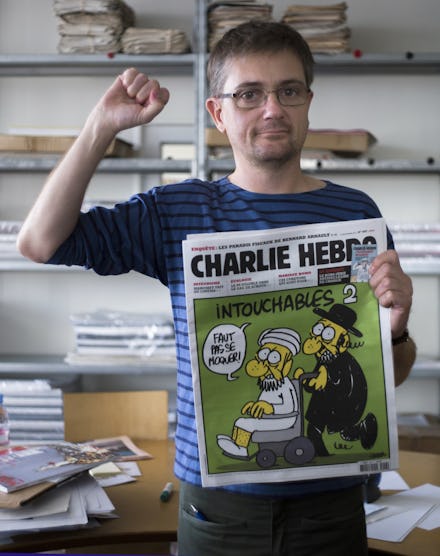Everyone Should Read 'Charlie Hebdo' Editor's 2011 Tirade Against Extremism and Censorship

The world is in shock after armed gunmen stormed the offices of French satirical newspaper Charlie Hebdo and massacred its staff Wednesday morning. According to media reports coming in from around the world, the attackers appeared to have a religious motivation, outraged over the newspaper's long history of lampooning the Islamic prophet Muhammad.
But Charlie Hebdo's editor Stéphane Charbonnier wasn't a man who could be pushed around. After a wave of threats and firebombing that immediately followed the publication of a caricature of the prophet in 2011, Charbonnier told German news magazine Der Spiegel that he wasn't intimidated.
"Extremists don't need any excuses," he told Der Spiegel. "We are only criticizing one particular form of extremist Islam, albeit in a peculiar and satirically exaggerated form. We are not responsible for the excesses that happen elsewhere, just because we practice our right to freedom of expression within the legal limits."
"If they are not amused by our cartoons, they don't need to buy our magazine," he said. "Of course they are allowed to demonstrate. The right to protest needs to be protected, so long as one abides by the law and refrains from violence. If we worried about the consequences of each of our drawings in each of our 1,057 issues, then we would have had to close shop a long time ago.
"It should be as normal to criticize Islam as it is to criticize Jews or Catholics. I have neither a wife nor children, not even a dog. But I'm not going to hide."
Charbonnier was reported among those killed in the attack; the death toll includes at least 11 others and 10 wounded. To the end, Charlie Hebdo continued rubbing extremists' nose in it: A tweet from the paper's account apparently posted shortly before the mass shooting sarcastically wished "especially good health" to Islamic State leader Abu Bakr al-Baghdadi.
But Charbonnier and his staff pushed hard for freedom of expression. Human rights activist Iyad El-Baghdadi took to Twitter to criticize the extremists who carried out the attack for responding to simple cartoons with horrible violence, thus kind of proving Charlie Hebdo's point:
The New Humanist issued a statement defending the paper's right to be provocative: "For now, it's worth stating that journalists should have the right to publish offensive material without fear of violent retribution. They should have the freedom to publish it, and others should have the freedom to criticise it. Let's defend those rights."
It similarly echoed Charbonnier's criticism of extremism and censorship: "One effect that terrorism can have is that it scares large groups of people into hating each other; into endorsing stereotypes and restrictive laws they might otherwise not. Let's resist that too."